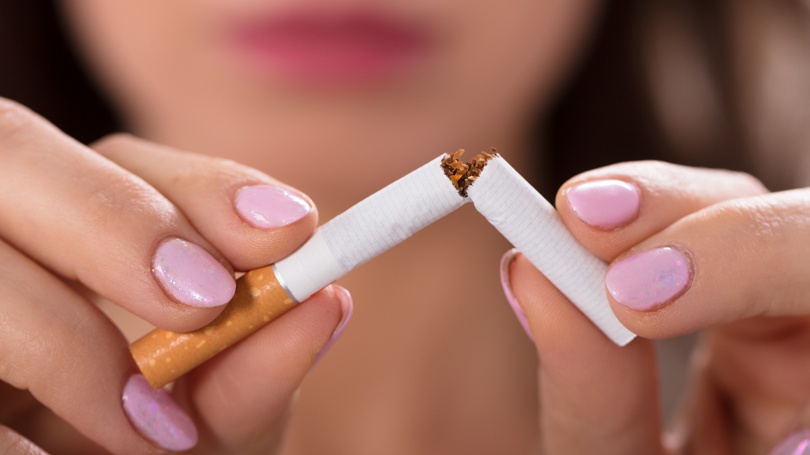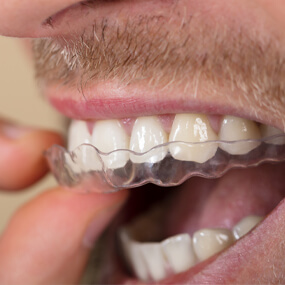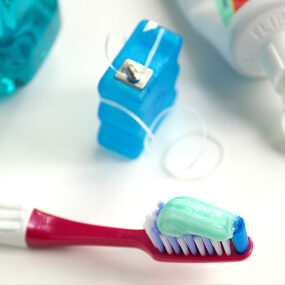How Smoking Can Damage Your Teeth and Gums

Awareness about the dangers of tobacco has never been greater. In fact, over the last decade, the percentage of smokers in the U.S. has dropped from 21 percent of adults to less than 14 percent. Despite that, smoking remains the leading cause of preventable deaths—about 480,000 annually.
The health problems caused by smoking extend far beyond just a shortened lifespan. Many smokers experience degraded health within just months. The mouth is a common problem area because smoking makes you more prone to gum disease. When that gum disease takes hold, constriction of the blood vessels in the gums makes symptoms less noticeable. The smoker is then more prone to tooth decay and may eventually experience tooth loss, bone loss, and other serious oral health issues.
Common Oral Health Issues Linked to Smoking
Smoker’s breath is immediately noticeable and off-putting to the nonsmoker. But as far as negative health effects related to smoking go, halitosis is just the tip of the proverbial iceberg.
- Bad breath – Smoking causes bad breath because the smoke and the chemicals leave a residue not just in the mouth but in the nose, throat, and lungs. Smoker’s breath is often exacerbated because smoking dries out the mouth, which means there is not enough saliva to wash away food particles, bacteria, and so forth. This bad breath is chronic and can worsen over time, especially as other oral health issues manifest.
- Tooth discoloration – Few substances yellow teeth as quickly and effectively as nicotine and tar. Tar is the residue left behind by burning tobacco, and the tacky brown substance is a natural staining agent. Nicotine, on the other hand, is colorless, but it reacts with oxygen and your teeth in a way that serves as a powerful staining agent as well. These stains cannot be brushed away and often cannot be bleached away either.
- Increased dental plaque and calculus – Smoking causes plaque to build up faster, which means that smokers often have a harder time managing it even if they brush and floss twice a day. Plaque hardens into calculus—also known as tartar—and since there is more of it, this is a big part of what makes smokers more prone to gingivitis and tooth decay.
- Periodontal disease – Gingivitis is the earliest form of gum disease and still reversible. But gingivitis can be hard to self-diagnose for a smoker and will eventually develop into periodontitis, which is a much more serious condition and not reversible. The soft tissues will continue to erode. The infection will worsen. As it does, permanent bone loss can occur, and at that point, smokers become much more susceptible to tooth loss.
- Inflamed salivary glands – While smoking a cigarette causes a salivatory response, any benefit is rather short-lived. Smoking causes dry mouth and is a net negative in that regard, and it makes a person prone to inflammation, infections, and even permanent damage to the salivary glands. It also lowers pH levels in the mouth, and a more acidic mouth predisposes you to dental erosion as well as tooth decay.
- Tooth loss – The Academy of General Dentistry estimates that men lose three teeth per decade as a smoker, and women lose about half that amount over the same period. Smokers lose teeth at double the rate of nonsmokers. A popular theory as to why is that the gums get less blood flow and thus less of the nutrients needed by the structures, such as the gums and jaw, that support the teeth.
- Bone loss – Numerous studies have demonstrated that smokers have less density in their jawbone and other oral bone structures than nonsmokers on average. This makes the teeth loosen, which leads to tooth loss.
- Slower healing – Smokers heal more slowly than nonsmokers after tooth extractions, dental implants, oral surgeries, and so forth. Reduced blood flow is among the reasons this occurs. It retards both healing processes and the immune system. Dry mouth intensifies the problem due to increased levels of bad bacteria. This diminished healing even affects your natural recovery from gingivitis and other minor oral health issues.
- Greater risk of leukoplakia – Leukoplakia is an oral health issue in which white to gray patches form on the tongue and elsewhere inside the mouth, and smoking is the leading cause of the condition. While leukoplakia is generally harmless and painless, it can be an ongoing issue for smokers that reduces the quality of life. In addition, despite being harmless in the short-term, leukoplakia is correlated to an increased risk of oral cancer.
- Increased risk of oral cancer – Oral cancer is as much as 10 times more common in people who have smoked than those who have never smoked. Carcinogens are substances capable of causing cancer, and there are many carcinogens in cigarettes. This means that smoking causes changes at the cellular level that makes you more prone to oral cancer.
Smoking: Tobacco vs. Cannabis
The discussion about smoking and oral health has traditionally centered on tobacco because cigarettes are legal and a widespread problem. Marijuana, however, is becoming legalized all over the country, and some estimates have participation rates at about 22 percent, which is greater than cigarette use just a decade ago. Therefore, it is important to note that according to the American Dental Association, many of the same risks are present when smoking marijuana: carcinogens, gum disease, xerostomia, leukoplakia, and increased cancer risk. People prescribed cannabis for medical reasons should explore alternative consumption methods that are better for their oral health and overall health as well.
Quitting Smoking
For smokers, quit smoking can be frustrating advice. You know you should quit. You may even want to but are apprehensive about trying or have tried and failed. These experiences are common. Overcoming the addiction is often a matter of nurturing the right state of mind. Focus on the benefits, such as:
- Fresher breath
- Halted tooth discoloration
- Enhanced sense of smell and taste
- Easier breathing
- More energy
- Reduced risk of fatal diseases
- No more secondhand smoke
- More money for the things you love
Make your own list of reasons and read them back to yourself whenever you struggle with the withdrawal symptoms. Smoking cessation experts also recommend certain lifestyle modifications while also indicating some changes to avoid. No tweak alone will make quitting easier, but the combined effort can stabilize you emotionally, make you feel better physically, and mitigate withdrawal symptoms.
- Balance your diet – Quitting smoking takes a great deal of energy, which is why many smokers feel tired when quitting, especially during the earliest phase. The process of expelling toxins is tasking, and you will need the calories and nutrients to fuel it. If you do not already eat a healthy diet, this is an excellent time to make changes to it. Avoid empty calories, such as junk food and soft drinks, which can make energy highs and lows as well as your symptoms more intense. You will likely have the urge to eat often. Use that appetite to your advantage by sipping a lot of water and having small bags of vegetables and fruits prepared.
- Eat regular meals and snack well – Many people worry about gaining weight when they quit smoking, and you may. But you actually put yourself at a mental and physical disadvantage if you try to control that while quitting. Besides, if you eat healthy foods, you have a lot less to worry about. Not eating can cause low blood sugar, which will not only trigger the urge to smoke but make those cravings more intense. Exactly how often you should eat depends. Some people prefer three large meals while others opt for five smaller ones. Avoid intermittent fasting and similar eating cycles during at least the first month.
- Supplement your diet with a multivitamin – Smoking causes nutrient depletion, which means that smokers are often deficient. This deficiency often extends into the quitting process and is exacerbated by the physical toll quitting can take on your body. Multivitamins provide a boost and help to offset fatigue and other withdrawal symptoms.
- Stay hydrated – Water is essential to flushing all the lingering toxins out of your body. Hydration is also great for your mental health and will cause cravings to trigger less often and be less intense when they do. Invest in a spill-proof water container and have water on hand at all times. Sip whenever you think about it. If you are someone who does not drink enough water, this is a perfect time to make that change. Avoid soft drinks. Limit your intake of coffee, which can trigger cravings. If you need a change of pace, consider herbal teas and the like, but try to avoid caffeine, sugar, and high acidic content.
- Practice deep breathing exercises – Deep breathing exercises are an excellent way to manage stress, and the more you practice them, the more natural it becomes. It is also an effective way to manage cravings. Cravings arrive suddenly, are very intense for a short period—around three minutes—and then are gone for an extended period. When you feel a craving coming on, sit down in a safe area, close your eyes, and practice deep breathing.
- Exercise – Exercise is an excellent way to manage stress, and it helps to reduce cravings. Experts recommend exercising every day—as opposed to taking one or two days off—when quitting smoking. Even a light activity such as a peaceful 15-minute walk around the neighborhood can reduce stress, improve your emotional state, reduce the frequency of cravings, and make them less intense when they do happen.
- Manage your stress – Managing stress is essential to good overall health, and you will be under a great deal of additional stress while quitting. Exercise and deep breathing will help substantially. You should also try other relaxation techniques, such as meditation, massages, yoga, hot showers, and so on.
- Sleep well – Another way to manage your stress and avoid fatigue is to get plenty of sleep. Be mindful that you may need more sleep than usual, and according to surveys, many adults tend to underestimate how much they require even under normal conditions. A relaxing pre-bedtime ritual can help you get the sleep you need.
- Change up your habits that trigger cravings – Enjoying a morning coffee is perhaps the most iconic trigger for nicotine cravings. But each person is unique and has multiple triggers. Identify yours, and modify the circumstances. Even subtle changes, such as moving breakfast from the kitchen to another room, can make a big difference. This is also an excellent opportunity to make your routines more efficient and more productive.
- Find the right distractions – Cravings inspire thoughts, and those thoughts can become the negative internal dialogue that eventually makes a person give up and smoke a cigarette. If you feel those thoughts coming on, find a distraction. If a particular pastime makes you think of smoking, change it up. If you crave cigarettes when watching TV, for instance, then opt for something more interactive, such as a video game or surfing the Web.
- Quitting smoking should be goal-oriented and rewarded – Many smoking cessation experts recommend software that tracks your quitting process—even down to the second—and there are many freeware programs available for your phone or computer. Milestones will be counted in minutes and hours at first but will become days, weeks, months, and even years. Small rewards, in the beginning, provide an emotional boost and foster positive associations.
- Equip your vehicle with avoidance strategies – Driving is a time where many people break down and have a cigarette. Make sure that the glovebox and the rest of the car are cigarette-free. Have your water bottle on hand so that you can sip it as needed. Keep an ample supply of sugar-free gum or candies on hand to help fight the cravings as well.
- Visit your dentist – If you do not see a dentist on a regular basis, this is an excellent time to start. If you do, make sure that you continue with your regular checkups and cleanings. Your dentist can give you updates on your improving oral health, and that can provide added motivation. When your teeth and gums are healthy enough, you can even opt for in-office teeth whitening, which can also provide a big morale boost.
Overcome the Damaging Effects of Smoking
If you smoke, it is imperative that you do everything in your power to quit as soon as possible. Quitting is never easy, but the sacrifices are fleeting while the benefits to your health will endure. Whether you smoke, are quitting, or have quit, Jeffrey D. Clark, DDS, can assess your oral health and develop a personalized treatment plan to overcome any damage and optimize your oral health moving forward. Call Scottsdale Cosmetic Dentistry Excellence today at 480 585 1853 with any questions you may have and to schedule your appointment.




